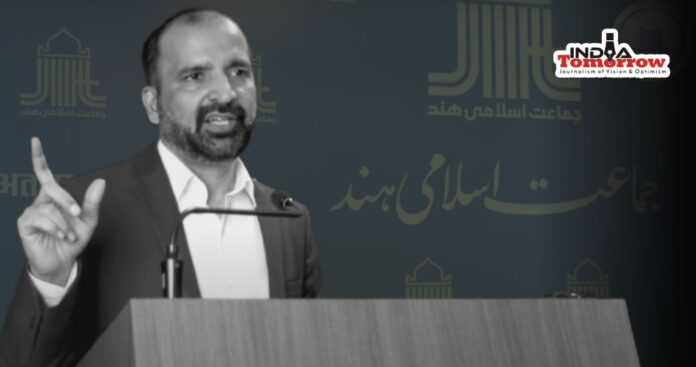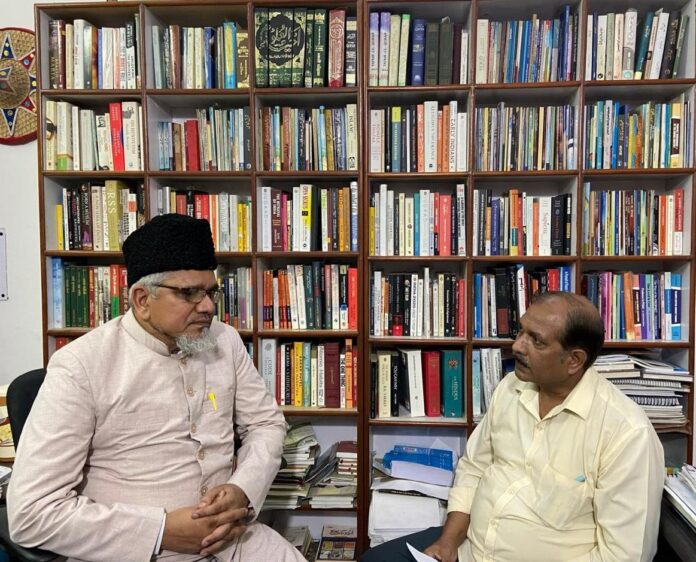NEW DELHI :

New Delhi:
In a programme at the Jamaat-e-Islami Hind (JIH) headquarters on the theme of “Rewriting History: Fact or Fiction,” historian and author Syed Ubaidur Rahman raised alarm over ongoing efforts to “rewrite” India’s historical narrative—efforts, he asserts, led by right-wing ideologies seeking to diminish the legacy of Muslim rule in India.
Syed Ubaid whose latest book ‘Peaceful Expansion of Islam in India’ was published earlier this year, began by asking, “What is history? And more importantly, what is its role in shaping the future? It is alarming that in this era, when Muslims have little interest in history, some forces are working tirelessly to distort the historical truth.”
He pointed out that the rise of the right wing elements had led to a systematic campaign to dilute nearly a thousand years of Muslim rule in India. “Their basic objective is clear: to erase the history of Muslim influence, whether in architecture, education, science, or culture—from India’s curriculum,” Ubaid emphasized, saying that this was part of a broader strategy to make the history of the Muslim community “invisible.”
Syed Ubaid stated, “Muslims have impacted all aspects of life in India. There was a period of almost 1000 years of Muslim rule during which architecture, education, science, language, food, and every aspect of life were influenced. Today, these very aspects are under attack by these elements. They not only want to rewrite political history but also wish to rewrite all these aspects.”
Weekly Ijtema || Rewriting History: Fact or Fiction || Syed Ubaidur Rahman / source: youtube / jamaat-i-islami hind
Raising a question about why they want to rewrite Indian history, Ubaid referenced Audrey Truschke, a respected historian of South Asian history at Rutgers University, USA who had critiqued the right-wing narrative. Truschke explained that Hindutva ideologues aim to claim Hindus as the only indigenous group in India, excluding Muslims and other minorities. “In their history, India’s past is framed as a glorious Hindu golden age followed by an era of Muslim oppression,” Truschke writes, “This narrative distorts the complex and multi-layered history of India.”
Syed Ubaid emphasized that political and religious identities are often conflated.
Syed Ubaid explains, “Audrey has written that there was no difference between the Muslim rulers and Hindu rulers in terms of religion, neither side attacked the other because of religion. Historian Khaleeq Ahmad Nizami has clearly written in his book that Muslim rulers had no religious or political intent or religious connotation behind their actions.”
Syed Ubaid remarked, “Earlier, the narrative was that Aurangzeb was hateful and tyrannical. But over time, they started painting all Muslim rulers with the same brush, whether it was Akbar, Alauddin Khilji, or any other Muslim ruler, they began targeting them all.”
Highlighting the growing tendency to remove crucial elements of history from school textbooks, Syed Ubaid said, ‘The revision of textbooks is not new. This has been a long-standing agenda of theirs.”
He lamented the sweeping changes that have been made to the school syllabus, stating, “About 30% of school syllabi have been altered. Specifically, content related to the Mughals, political science textbooks, secular ideas, Gandhiji and his assassination, the Delhi Sultanate, all of these aspects have been significantly altered or reduced.”
Highlighting significant changes to the history curriculum, especially in Class 7, where children are first introduced to historical narratives, Syed Ubaid pointed out that the achievements of Mughal kings, such as Humayun, Shah Jahan, Akbar, Jahangir, and Aurangzeb, which had previously been presented in a two-page chart in the history textbook Our Past Too, were removed. Ubaid also mentioned the removal of a chapter on Akbar’s plural politics, which had once depicted the Mughal emperor in a positive light.
Syed Ubaid said, “the Mughals, who had ruled India for almost 350 years, from 1526 to 1857, have been a primary target in these revisions.” He criticized the effort to dilute the significance of the Mughals in textbooks, asserting that while the Mughal rule weakened toward the end, regional rulers such as the Marathas, Rohillas, Tipu Sultan, and Hyder Ali continued to govern with the Mughal imperial mandates.
Refuting the claim that the Mughals were given disproportionate importance in history textbooks while regional kingdoms were underrepresented, Syed Ubaid pointed out that the Vijayanagara Empire in South India and the Kakatiya dynasty from the 15th and 16th centuries were well-documented in textbooks.
However, he observed that regional Muslim kingdoms, such as the Bahmani Empire in the Deccan and the Gujarat Sultanate, both of which played significant roles during the same period, received much less attention in the current syllabus. Despite their rich heritage, these Muslim kingdoms are scarcely mentioned.
Ubaid emphasized that these changes are not confined to schoolbooks but extend to university curricula as well.
Syed Ubaid said, “even at the Aligarh Muslim University, once renowned for its medieval history department, professors are struggling as much of the material has been cut. Senior historian from the AMU, Prof.Irfan Habib has also noted that the entire Delhi Sultanate is now covered in just one sub-unit in unit one at the graduation level.
Citing Prof. Irfan Habib, he noted, “In the revised syllabus, Khilji, Tughlaq, and the invasion of Taimur are now condensed into a single unit. Unit 2 omits significant figures and events, such as Akbar, and instead focuses on figures like Hemu, Vikramaditya, Rana Pratap, Rani Durgavati, and Chand Bibi. Mughals like Jahangir and Shah Jahan have been removed.” Ubaid’s concerns about the erasure of Muslim contributions to India’s history went beyond textbooks.
He criticized the ongoing attempts to rename cities founded during the Muslim rule, such as Faizabad, Aurangabad, Ahmedabad, and Ahmednagar.
Warning that these efforts to distort historical narratives are part of a broader trend, where online platforms will increasingly present biased versions of history, he said, “In the future, when you search for history on platforms like Google or Amazon, you will find only materials based on misrepresentations and backing their narratives.”
Ubaid concluded his speech with a call to action: “We must not allow the erasure of history to continue. We need to encourage our children to read books rooted in historical accuracy, to understand our past, and to defend the truth. We should foster an interest in history and make an effort to include such books in our personal libraries. Just as Muslims teach foundational religious texts to their children, we must ensure historical books are part of their education.”
Beginning his speech, Syed Ubaid outlined four key phases of Muslim history in India: the early arrival of Islam through traders especially in causal India, the establishment of the Delhi Sultanate, the rise of regional sultanates, and the powerful legacy of the Mughal Empire.
source: http://www.indiatomorrow.net / India Tomorrow / Home> Education / by Anwarulhaq Baig / December 03rd, 2024









